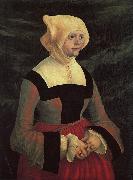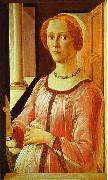
|
Albrecht Altdorfer
|
|||
|
|
|||
| German 1480-1538 Albrecht Altdorfer Galleries He most often painted religious scenes, but is mainly famous as the first frequent painter of pure landscape, and also compositions dominated by their landscape. Taking and developing the landscape style of Lucas Cranach the Elder, he shows the hilly landscape of the Danube valley with thick forests of drooping and crumbling firs and larches hung with moss, and often dramatic colouring from a rising or setting sun. His Landscape with footbridge (National Gallery, London) of 1518-20 is claimed to be the first pure landscape in oil. He also made many fine finished drawings, mostly landscapes, in pen and watercolour. His best religious scenes are intense, sometimes verging on the expressionistic, and often depict moments of intimacy between Christ and his mother, or others. His most famous religious artwork is the The Legend of St. Sebastian and the Passion of Christ that decorated the altar in the St. Florian monastery in Linz, Austria. He often distorts perspective to subtle effect. His donor figures are often painted completely out of scale with the main scene, as in paintings of the previous centuries. He also painted some portraits; overall his painted oeuvre was not large. | |||
|
|
|||
|
Portrait of a Lady Albrecht Altdorfer4.jpg Painting ID:: 2289 |
|||
|
|
|||
|
Walter Griffin
|
|||
|
|
|||
| 1861-1935 Walter Burley Griffin November 24, 1876?CFebruary 11, 1937) was a US architect and landscape architect, who is best known for his role in designing Canberra, Australia's capital city. He has also been credited with the development of the L-shaped floor plan, the carport and the first use of reinforced concrete. Influenced by the Chicago-based Prairie School, Griffin went on to develop a unique modern style. For much of his career Griffin worked in partnership with his wife Marion Mahony Griffin. In the 28 years of their architectural partnership, the Griffins designed over 350 building, landscape and urban-design projects as well as designing construction materials, interiors, furniture and other household items. | |||
|
|
|||
|
Portrait of a Lady Walter Griffin1.jpg Painting ID:: 4051 |
1897 | ||
|
|
|||
|
Robert Campin
|
|||
|
|
|||
| 1406-1444 Robert Campin Location South Netherlandish painter. He is first mentioned in 1405-6 as a painter in Tournai. As he purchased citizenship there in 1410, he may have been born elsewhere. There is evidence of some connection with Valenciennes, where the name Campin is said to have been common, but nothing certain is known of his artistic training and background. | |||
|
|
|||
|
Portrait of a Lady new3/Robert Campin_qCgVqM.jpg Painting ID:: 18905 |
1420-30, The National Gallery at London | ||
|
|
|||
|
Sandro Botticelli
|
|||
|
|
|||
| Italian Early Renaissance Painter, 1445-1510 Italian painter and draughtsman. In his lifetime he was one of the most esteemed painters in Italy, enjoying the patronage of the leading families of Florence, in particular the Medici and their banking clients. He was summoned to take part in the decoration of the Sistine Chapel in Rome, was highly commended by diplomatic agents to Ludovico Sforza in Milan and Isabella d Este in Mantua and also received enthusiastic praise from the famous mathematician Luca Pacioli and the humanist poet Ugolino Verino. By the time of his death, however, Botticelli s reputation was already waning. He was overshadowed first by the advent of what Vasari called the maniera devota, a new style by Perugino, Francesco Francia and the young Raphael, whose new and humanly affective sentiment, infused atmospheric effects and sweet colourism took Italy by storm; he was then eclipsed with the establishment immediately afterwards of the High Renaissance style, which Vasari called the modern manner, in the paintings of Michelangelo and the mature works of Raphael in the Vatican. From that time his name virtually disappeared until the reassessment of his reputation that gathered momentum in the 1890s | |||
|
|
|||
|
Portrait of a Lady Sandro Botticelli22.jpg Painting ID:: 10002 |
1470-1475. Tempera on panel Victoria and Albert Museum,London,UK. | ||
|
|
|||
|
El Greco
|
|||
|
|
|||
| Greek-born Spanish Mannerist Painter, 1541-1614 Considered a representative of late Renaissance Spanish art, El Greco was actually born in Greece, on the island of Crete. After studying in Venice under Titian, El Greco settled in Toledo, Spain in 1577. At the time he was wildly popular, his emotionally religious paintings being just the ticket for the hometown of the Spanish Inquisition. After his death his work was largely ignored until the beginning of the 20th century; now he considered one of the inspired geniuses of Western art. His distinctive style features bold shapes and colors, with elongated and slightly distorted figures. In Toledo El Greco was in constant demand and liked living large: he maintained a private orchestra to accompany his meals. | |||
|
|
|||
|
Portrait of a Lady new3/El Greco_JqXyn4.jpg Painting ID:: 19030 |
approx. 1594-1601, Philadelphia Museum of Art. | ||
|
|
|||
|
Also Buy::. For Following Paintings / Artists / Products, Please Use Our Search Online: |












